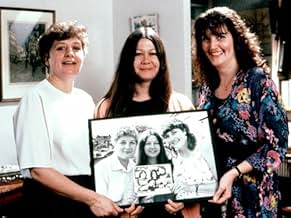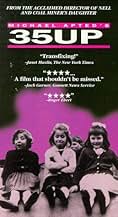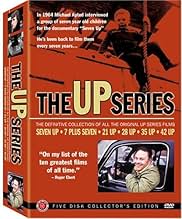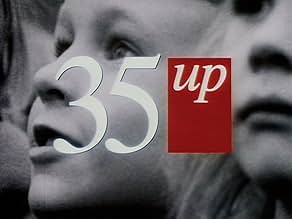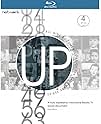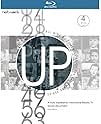35 Up
- Película de TV
- 1991
- 2h 3min
PUNTUACIÓN EN IMDb
8,0/10
2,9 mil
TU PUNTUACIÓN
Añade un argumento en tu idiomaDirector Michael Apted interviews the same group of British-born adults after a seven-year wait as to the changes that have occurred in their lives during the last seven years.Director Michael Apted interviews the same group of British-born adults after a seven-year wait as to the changes that have occurred in their lives during the last seven years.Director Michael Apted interviews the same group of British-born adults after a seven-year wait as to the changes that have occurred in their lives during the last seven years.
- Dirección
- Guión
- Reparto principal
- Ganó 1 premio BAFTA
- 1 premio y 2 nominaciones en total
Bruce Balden
- Self
- (as Bruce)
Jacqueline Bassett
- Self
- (as Jackie)
Symon Basterfield
- Self
- (metraje de archivo)
- (as Symon)
Andrew Brackfield
- Self
- (as Andrew)
John Brisby
- Self
- (as John)
Suzanne Dewey
- Self
- (as Suzy)
Charles Furneaux
- Self
- (metraje de archivo)
- (as Charles)
Nicholas Hitchon
- Self
- (as Nick)
Neil Hughes
- Self
- (as Neil)
Lynn Johnson
- Self
- (as Lynn)
Paul Kligerman
- Self
- (as Paul)
Susan Sullivan
- Self
- (as Sue)
Tony Walker
- Self
- (as Tony)
Michael Apted
- Interviewer
- (voz)
- (sin acreditar)
Peter Davies
- Self (ages 7, 14)
- (metraje de archivo)
- (sin acreditar)
Reseñas destacadas
The fifth chapter in the ongoing seven-year cycle of documentaries catches up with all but two of the original kids, after following their development from childhood through repressed adolescence to (mostly) hopeful young adulthood, and here to a more or less stable maturity. The changes in the past seven years are less dramatic than those revealed in '28 Up', but with each new installment the series grows more rich and provocative, and seeing the latest episode is like visiting old friends.
Some of the stories have taken surprising turns: the upper class snobbery of Andrew and John (who refused to appear in the previous film) has mellowed with age. Destitute Neil is doing community theater in the Shetland Islands. And the trio of friends (Jackie, Lynn and Sue), whose lives were the least interesting seven years earlier now each deserve their own separate film (one of them is suffering, with bitterness, from an obscure neurological disorder). Director Michael Apted's socio-political assumptions have long since fallen by the wayside; the series might have started as an experiment in social upbringing with an eye on class distinctions, but if anything the films prove that time is the great equalizer.
Some of the stories have taken surprising turns: the upper class snobbery of Andrew and John (who refused to appear in the previous film) has mellowed with age. Destitute Neil is doing community theater in the Shetland Islands. And the trio of friends (Jackie, Lynn and Sue), whose lives were the least interesting seven years earlier now each deserve their own separate film (one of them is suffering, with bitterness, from an obscure neurological disorder). Director Michael Apted's socio-political assumptions have long since fallen by the wayside; the series might have started as an experiment in social upbringing with an eye on class distinctions, but if anything the films prove that time is the great equalizer.
Ho-hum. This is my least favorite of the series so far. Except for Neil and Bruce (doing a teaching stint in Bangladesh), there's not much going on with these people that's surprising or interesting (I do still like Nick for some reason, but his life isn't all that thrilling). A couple of divorces, a few dead parents, but nothing that special and nothing that revealing. John is back, slightly less douchey for his humanitarian work in Bulgaria, but still obviously a twit underneath. In a rather odd turn, Symon -- the one ethnic minority of the group -- doesn't even get a mention, his existence has been completely erased from the series. Hopefully this is by his own request. The larger problem here is that the recaps are starting to overwhelm the new material. Roughly half of the film, possibly more, consists of previous clips. And it's almost always the same clips, meaning there are many parts of Seven Up that I've now seen five times. Again, this is probably best for people watching one of these every seven years, but as an at-home DVD experience it's a drag. It feels like all you really need to do is watch the most recent installment and to hell with the others. And yet, I'm moving on to the next one anyway. Despite my griping, there is an addictive quality to these films.
Life continues; a parent's life ends (and it is never one that ends too early and you never get over it);; new life is created and comes into family; one of the subject (Tony's) wife takes up some extra work duties and it is clear she has to run the house; life springs some horses to ride around and feel merry; life is a little more awkward when a figure gets recognized in public (though "you get the odd one who is rude..."); life leads you sometimes to Bangladesh (what a mess) or Wisconsin (there are deer, surprised); life is harder because the government under Thatcher was (lightly put) a grave disappointment; another parent died and you can see every bit of the devastation in their eyes and the 30s is the time when people start losing their parents; and life is going to keep going on even if things looked grim (or quite good) for the particular subject at hand.
I find 35 Up to be as on par with the absorbing feeling and interest into this series as the rest - when it comes to absorption and the Up films, just call me a big pack of paper towels - but one of the fascinating parts here is how some of the subjects (like Nick) look back on the previous Up film and how they thought, or really the spouses thought, they came across made it so they were not sure to want to appear in the next film. Charles doesn't appear here at all, a shame as he was one of the more low-key captivating ones from 21 and 28 Up (working for the BBC perhaps ironically he didn't want to appear on TV in this film).
Sometimes seeing oneself on film can do that, and I think that it is remarkable just how many of the subjects agreed to be in the series up till 35 much less than this continued for decades afterward. And in the case of John, of course, they didn't appear in the previous entry and that means we are seeing then go from 21 to 35 and that is also another sort of jump (he didn't even get interviewed by Apted due to a falling out, who knows why, and he's speaking with an assistant here) as he makes his case for Bulgarian charity. Because who doesn't want to give to... Bulgaria!
I'm not sure what else I can add that Roger Ebert didn't touch on in his multiple write-ups on the films in this series, and I'm sure there will be even more to get out of seeing how these adults and their spouses and (if they choose to be included) the kids in 42, but this segment in particular is so striking because of how these children are not only in full adulthood but now, more or less, parents and losing their parents and finding that living any decent life means finding peace in one's work and social situation and, moreover, responsibilities.
Take it from someone who knows: when you're 14 or even 21, you literally don't know how much you are going to bristle and smile and maybe look away from how you were at that age by the time you're 35 (or, if you have kids which I don't, you'll see those qualities in them). That's the power of this series and 35 Up in particular.
I find 35 Up to be as on par with the absorbing feeling and interest into this series as the rest - when it comes to absorption and the Up films, just call me a big pack of paper towels - but one of the fascinating parts here is how some of the subjects (like Nick) look back on the previous Up film and how they thought, or really the spouses thought, they came across made it so they were not sure to want to appear in the next film. Charles doesn't appear here at all, a shame as he was one of the more low-key captivating ones from 21 and 28 Up (working for the BBC perhaps ironically he didn't want to appear on TV in this film).
Sometimes seeing oneself on film can do that, and I think that it is remarkable just how many of the subjects agreed to be in the series up till 35 much less than this continued for decades afterward. And in the case of John, of course, they didn't appear in the previous entry and that means we are seeing then go from 21 to 35 and that is also another sort of jump (he didn't even get interviewed by Apted due to a falling out, who knows why, and he's speaking with an assistant here) as he makes his case for Bulgarian charity. Because who doesn't want to give to... Bulgaria!
I'm not sure what else I can add that Roger Ebert didn't touch on in his multiple write-ups on the films in this series, and I'm sure there will be even more to get out of seeing how these adults and their spouses and (if they choose to be included) the kids in 42, but this segment in particular is so striking because of how these children are not only in full adulthood but now, more or less, parents and losing their parents and finding that living any decent life means finding peace in one's work and social situation and, moreover, responsibilities.
Take it from someone who knows: when you're 14 or even 21, you literally don't know how much you are going to bristle and smile and maybe look away from how you were at that age by the time you're 35 (or, if you have kids which I don't, you'll see those qualities in them). That's the power of this series and 35 Up in particular.
The 'Up Series' represents one of the most fascinating and unusual uses of film in cinema history - a documentary life-long chronicle of the lives of 14 people starting at 7 years old, revisiting them every seven years through age 49 (so far).
While I could quibble, wishing for a bit more depth here and there (especially with the women, where there's a bit too much emphasis on love and marriage at the expense of all else), it's really an astounding, moving, frightening and uplifting document. There's no way to watch this remarkable series of films without reflecting deeply on one's own life, and how you have changed (and stayed the same) over your own lifetime.
While Michael Aped deserves every bit of credit he's received for this amazing piece of cultural anthropology, it's important to note this first film, 7 Up,was actually directed by Paul Almond, and Apted was a that point a researcher for the project.
While I could quibble, wishing for a bit more depth here and there (especially with the women, where there's a bit too much emphasis on love and marriage at the expense of all else), it's really an astounding, moving, frightening and uplifting document. There's no way to watch this remarkable series of films without reflecting deeply on one's own life, and how you have changed (and stayed the same) over your own lifetime.
While Michael Aped deserves every bit of credit he's received for this amazing piece of cultural anthropology, it's important to note this first film, 7 Up,was actually directed by Paul Almond, and Apted was a that point a researcher for the project.
Director Michael Apted revisits his kids once again 7 years later. They are 35 now and they continue to surprise.
Some of them face the deaths of their parents. In the case of Paul, he's reconnecting with his father. There is more reflection now that they're in the middle age area. They aren't kids anymore.
The biggest disappointment has to be the missing participants. Charles continues to not participate. And now Peter and Simon are gone. Certainly we want at least an update. The most heart warming part has to be Neil. The fact that he isn't dead in the middle of nowhere is a big victory.
Some of them face the deaths of their parents. In the case of Paul, he's reconnecting with his father. There is more reflection now that they're in the middle age area. They aren't kids anymore.
The biggest disappointment has to be the missing participants. Charles continues to not participate. And now Peter and Simon are gone. Certainly we want at least an update. The most heart warming part has to be Neil. The fact that he isn't dead in the middle of nowhere is a big victory.
¿Sabías que...?
- CuriosidadesSymon Basterfield elected not to take part in this installment because he was in the midst of a divorce at the time.
- Citas
Andrew Brackfield: When I see the children playing now, I realise how much fun they have together and it's probably what I missed being an only child.
Selecciones populares
Inicia sesión para calificar y añadir a tu lista para recibir recomendaciones personalizadas
Detalles
Taquilla
- Recaudación en Estados Unidos y Canadá
- 922.872 US$
- Fin de semana de estreno en EE. UU. y Canadá
- 13.690 US$
- 20 ene 1992
- Recaudación en todo el mundo
- 922.872 US$
- Duración
- 2h 3min(123 min)
- Color
- Relación de aspecto
- 1.33 : 1
Contribuir a esta página
Sugerir un cambio o añadir el contenido que falta

